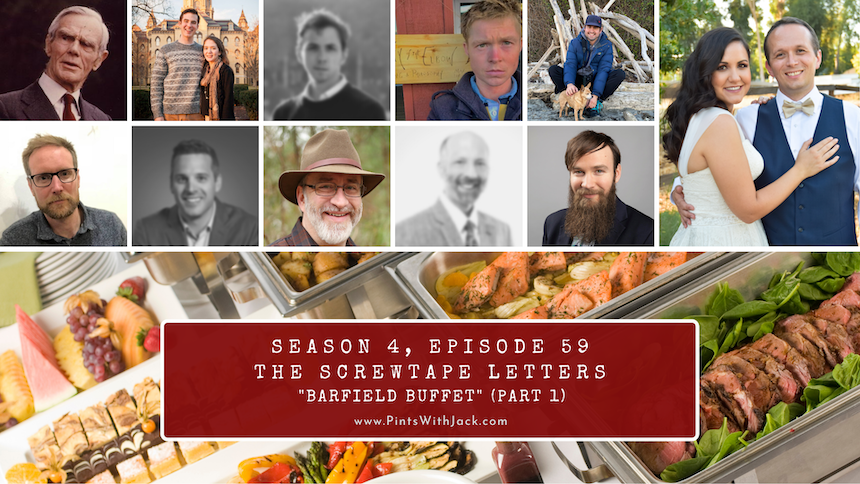
As we near the end of Barfield Month, a number of different Barfield fans and scholars share their thoughts on this Inkling.
S4E59: “Barfield Buffet” (Part 1) (Download)
If you enjoy this episode, you can subscribe manually, or any place where good podcasts can be found (iTunes, Google Play, Amazon, Podbean, Stitcher, TuneIn and Overcast), as well as on YouTube. The roadmap for Season 4 is available here.
More information about us can be found on our website, PintsWithJack.com. If you’d like to support us and get fantastic gifts, please join us on Patreon.
Timestamps
00:00:00 – Entering “The Eagle & Child”…
00:00:14 – Welcome
00:00:53 – Buffet Introduction
00:02:01 – Dr. Charlie Starr (Barfield Overview)
00:21:27 – Landon Loftin
00:28:40 – Dr. Troy Vine
00:35:58 – Dr. Max Leyf
00:41:50 – Dr. Michael Di Fuccia
01:02:32 – “Last Call” Bell and Closing Thoughts
YouTube Version
After Show Skype Session
No Skype Session today!
Show Notes
- Today is the final Thursday in April, meaning that this should be the last episode in Barfield month…but it’s not. Over the past month we’re been looking at the life and work of Owen Barfield, the First and Last Inkling.
- We’ve spoken to his grandson, Owen A. Barfield
- We’ve looked at his literature and poetry with Jake Grefenstette
- We’ve seen how Tolkien manifested some of Barfield’s ideas surrounding language with Dr. Rob Koons
- Last week we spoke to Mark Vernon about his book, The Secret History of Christianity, applying Barfield’s ideas surrounding the evolution of consciousness to the story of salvation history.
- Over the course of this month, I’ve had a number of Barfield fans and scholars reach out to me, and so I decided to host what I’m calling a “Barfield Buffet”. I invited these scholars to tell us about how they came across Barfield and also to talk about some of the value they find in his works. I then stitched those different monologues together.
- Today I’m sharing Part 1 of the Buffet (or the Appetizer course, if you will…). Next Thursday I’ll be sharing Part 2 because I had so many folks want to share their Barfieldian experiences.
Quote-of-the-week
“When the velocity of progress increases beyond a certain point, it becomes indistinguishable from crisis.”
Owen Barfield, Night Operation
Drink-of-the-week
- Black tea with milk
Monologues
Dr. Charlie Starr
We begin with a former guest of the show, Dr. Charlie W. Starr, teacher of English and humanities at Alderson Broaddus University and author of “The Fawn’s Bookshelf”. Back in Episode 49, I interviewed Dr. Starr about “The Archangel Fragment”, as well as the books he’s written.
When we were chatting beforehand about the podcast and our plans to do Barfield Month he wrote in an email: “So I’m teaching in this Inklings doctoral program with Northwind Seminary, and in addition to team teaching the Lewis course, I’m teaching the Tolkien course and was crazy enough to volunteer for the Barfield course” so, in after we had finished talking about the Archangel Fragment, I asked Dr. Starr to give our listeners a 15-20 minute summary of Barfield’s life, work and ideas… a useful recap as we turn the final corner of Barfield Month…
In his monologue, Dr. Starr talks about the conversation between Pilate and Jesus, I remembered something I learnt many years ago… I think it was when I was reading Bill Bryson’s book on the history English language called “The Mother Tongue”. In that book we were told that anagrams were all the rage in the Roman Empire. He gave an example of a Latin phrase which sounded rather familiar to me: “Quid est veritas?” This is the (rather cynical) question asked of Jesus by Pontius Pilate; what is truth? And even though I don’t think Bryson connected that anagram to this event, it turns out that there is a rather appropriate anagram for Pilate’s words… The letters in “Quid est veritas?” can be rearranged to form “Est vir qui adest”, the translation of which is “It is the man who is here”. What is truth? It is a person – the God-Man Jesus Christ!
Landon Loftin
Landon Loftin, a hospital chaplain and PhD student from Missouri, who is currently preparing to write his dissertation on Barfield. Has has a peer-reviewed paper for VII, which is the journal of the Wade Center at Wheaton, called Barfield and the Modern Crisis of Meaning.
Troy Vine
Troy Vine started out as a physicist, but reading Barfield inspired him to do a second PhD, this time in philosophy, in which he explores the development of the conception of colour from Descartes, via Newton and Goethe, to Wittgenstein.
He’s just started teaching a short online course on Barfield, focussing on two particular works, Poetic Diction and Saving the Appearances.
Dr. Max Leyf
Dr. Max Leyf is a certified Rolfer, philosopher, and anthroposopher from Anchorage, Alaska. He appears on TheoriaPress.Wordpress.com and is the author of The Redemption of Thinking: A Study in Truth, Knowledge, and the Evolution of Consciousness with Special Reference to Johann von Goethe, Owen Barfield, and Rudolf Steine.
Dr. Michael Di Fuccia
Dr. Michael Vincent Di Fuccia is the Research Lead for the Martin Institute for Christianity and Culture at Westmont College and Visiting Lecturer at London School of Theology. He is the author of Owen Barfield: Philosophy, Poetry, and Theology.
